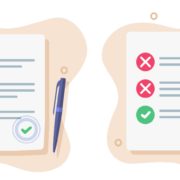Advice For Taking The MPRE After The Bar Exam
Advice For Taking The MPRE After The Bar Exam
The Multistate Professional Responsibility Exam (MPRE) is required for bar admission in most jurisdictions (with a few exceptions). Most applicants take the MPRE during law school (which we recommend!) so that it is done and out of the way before tackling the bar exam. Some students, however, end up taking the MPRE after the bar exam, either unaware of the option of taking it sooner, taking it but failing the first time, or simply choosing to worry about it after the bar exam is done. This post addresses our best advice for approaching the MPRE after the bar exam.
Advice For Taking The MPRE After The Bar Exam
MPRE Basics
The MPRE tests the American Bar Association (ABA)’s Model Rules of Professional Conduct, as well as case law, rules, and legal opinions that reflect majority law concerning the ethical rules that govern attorneys. The National Conference of Bar Examiners (NCBE) is responsible for drafting and scoring the exam, and it is administered online at Pearson VUE testing centers three times a year (with two test dates each administration):
- Twice in March
- Twice in August
- Twice in October/November
Examinees have two hours to answer 60 multiple-choice questions. Each multiple-choice question has four answer choices. Fifty of the questions are scored while ten of the questions are questions that are “test questions” and do not count towards the final score. Passing scores vary by jurisdiction, ranging from 75 to 86, so be sure to check out your jurisdiction’s individual score requirements.
The MPRE tests the following topics (with the percentage of exam questions for each topic in parentheses):
- Conflicts of interest (12–18%)
- Litigation and other forms of advocacy (10–16%)
- Lawyer-client relations (10–16%)
- Competence, legal malpractice, and other civil liability (6–12%)
- Client confidentiality (6–12%)
- Regulation of the legal profession (6–12%)
- Different roles of a lawyer (4–10%)
- Communications about legal services (4–10%)
- Safekeeping funds and other property (2–8%)
- Transactions and communications with other persons (2–8%)
- Judicial conduct (2–8%)
- Lawyer’s duties to the public and legal system (2–4%)
All United States jurisdictions require students to take the MPRE with the exception of Wisconsin and Puerto Rico. Connecticut and New Jersey waive the MPRE requirements if you successfully complete a professional responsibility course with the requisite course grade.
Limitations on When You Can Take the MPRE
Ideally, you will take the MPRE before the bar exam (and if you still have the opportunity to do so, we highly recommend it!). More specifically, it is a good idea to sit for the MPRE right after you complete, or concurrently with taking, your law school’s professional responsibility course (or its equivalent). Most students take this course during their 2L year or the beginning of their 3L year, leaving plenty of time to take the MPRE during one of the six available exam administrations during law school.
If you plan to take the MPRE after the bar exam though, first make sure that your jurisdiction allows it! Rules vary from state-to-state, and some jurisdictions place timing constraints on when you need to pass the MPRE. For example:
- Many states require that you pass the MPRE within a certain number of months after taking the bar exam.
- Other states (such as Michigan) allow you to take the bar exam only once without a passing MPRE score.
- Several states (such as Massachusetts) require a passing MPRE score prior to taking the bar exam (if you are reading this post, this probably does not apply to you though!).
Because MPRE timing requirements vary, it is critical to check your jurisdiction’s rules regarding timing as early as possible so that you can plan accordingly.
How to Prepare for the MPRE After the Bar Exam
Our list below includes some of our best advice to set you up to study for (and pass!) the MPRE after taking the bar exam.
1. Sign Up For A Commercial MPRE Course
Many students make the mistake of trying to self-study or self-teach the material tested on the MPRE. Some assume that they’ve learned everything they need to know in their law school Professional Responsibility course or that ethics questions are common sense and easy to guess. One of the most common myths about the MPRE is that you don’t need to study or spend much time preparing. The MPRE is not impossible, but it is a hard exam. About one in four test-takers fail the MPRE.
You probably took a commercial course to prepare for the bar exam, and the MPRE is no different. Signing up for a commercial course is one way to help ensure you pass. The best part is that most commercial companies offer MPRE courses and outlines for free! Learn more about JD Advising’s highly-rated free, MPRE course here and browse our free MPRE guide here. And, if you are short on time, we even have a free MPRE crash course!
In addition to being free, an MPRE course can help you learn the material and prepare you for the exam more efficiently and effectively. You will have a schedule to follow—suggesting exactly what, when, and how long to study. Commercial courses are experts at the exam, compiling their best advice and materials for your review. Every single part of an MPRE prep course, from the questions to the outlines, is tailored to help you pass!
If you’re still not convinced, check out this post with four reasons why you need an MPRE course.
2. Make sure you understand the law (especially the highly-tested topics!).
This step might sound obvious, but it is important to learn and understand the ABA Model Rules of Professional Conduct in order to pass the MPRE. Make sure you devote time to reading, understanding, and memorizing the Model Rules. As noted above, many students fall for the misconception that the MPRE is easy enough to guess on questions.
This is especially true since you will take the MPRE after the bar exam. A failing MPRE score could be the only thing standing between you and admittance to the bar if you pass the bar exam but fail the MPRE. By making sure you understand the law, you will help ensure you do not derail the timing of your legal career.
The best way to study smart for the MPRE is to focus on highly-tested topics. Not all topics are treated equally. Some (e.g., conflicts of interest) appear significantly more than others (e.g., lawyers’ duties to the public and the legal system). So, you want to focus on getting down the topics that are most likely to earn you points on the exam. Check out our MPRE topic frequency chart here!
It is also more efficient to memorize smaller portions at a time. If your outline is 50 pages, for example, you could divide it into 10 sections of 5 pages (though we recommend dividing at natural stopping points rather than in the middle of a section). Then, memorize each one, section by section, until you have all of the rules memorized. You can go back to test yourself periodically to keep the material fresh.
For a quick start to learning the highly tested rules, check out our MPRE attack outline and MPRE one-sheet!
3. Review MPRE keywords and key phrases.
If you plan to take the MPRE after the bar exam, you probably are well versed in paying close attention to keywords and key phrases. After all, issue spotting and reading closely are key for bar exam success. Similarly, with the MPRE knowing how the NCBE utilizes these words and phrases so you know what to expect can be useful.
For example, a common call of the question on the MPRE is “Is this lawyer subject to discipline?” However, you will see that same question appear in a slightly different form such as “Is this lawyer subject to litigation sanctions?” or “Is this lawyer subject to civil liability?”
Knowing MPRE keywords and phrases helps to make the process of eliminating incorrect answers much simpler because you’ll know what “subject to discipline,” “subject to litigation sanctions,” or “subject to civil liability” all mean. And thus, you will know what answers to look for, increasing your chances of passing the MPRE after the bar exam!
For more on this, look over our post on understanding MPRE keywords and phrases.
4. Practice using real MPRE questions.
“Real” MPRE questions are the questions the NCBE periodically releases. Thus, for obvious reasons, real MPRE questions are the most similar to the actual questions you will encounter on the MPRE. They familiarize you with the fact patterns the NCBE tends to use, the complexity and length of questions the NCBE tends to use, and the structure of the question the NCBE tends to use. That is why there is no substitute for using real MPRE practice questions to study. They will best prepare you for what you will see on exam day!
By comparison, students often complain that when using commercial course-invented questions, some questions are too hard, others are too easy, and they are overall not representative of what actual MPRE questions look like on exam day. The NCBE periodically releases a number of previously-used MPRE questions, which are available for purchase across various platforms (such as through the NCBE and JD Advising).
Once you start practicing with real MPRE questions, answer them one by one and review the answer explanation. If you did not know a rule, write it down. If you did not understand what the call of the question asked, write down a reminder of what that call of the question was really asking. Continuously practice and review to best prepare for the MPRE after the bar exam. And when you are ready to start practicing, review our post on how to answer an MPRE question!
5. Take the MPRE seriously.
In case we haven’t made it clear enough already, we want to stress the importance of taking the MPRE seriously—especially if you are taking it after the bar exam!
It will be worth putting in the time and effort required to pass the first time you take the exam. Many test-takers study for two weeks or less and pass the MPRE, but you will be at an advantage if you set aside about a month to study.
Because you will potentially be on a shortened timeline for receiving a passing score on the MPRE after taking the bar exam, studying for a month or at least two weeks is a much safer bet. Your commercial course will likely have a schedule. But just in case it does not, or you prefer a different format, we put together suggested MPRE study schedules with one-month, two-week, and one-week timelines to fit all types of timing needs!
If you take the MPRE seriously and follow the steps outlined above when you study for the MPRE, you are putting yourself in the best position possible to tackle the MPRE after the bar exam! For more information about the MPRE, check out our two-part frequently asked questions (FAQ) series: MPRE Frequently Asked Questions (FAQs): Part 1 and MPRE Frequently Asked Questions (FAQs): Part 2.
Looking to Ace the MPRE?
- Enroll in our 5-star rated free MPRE Course, complete with expert guidance, an exclusive outline, practice questions, and a one-sheet.
- Tackle the Real MPRE questions — the gold standard for test preparation.
- Elevate your preparation with personalized MPRE private tutoring, featuring a tailored study plan and dedicated MPRE outline.
- Dive into our assortment of complimentary top-notch MPRE resources for your success.












Leave a Reply
Want to join the discussion?Feel free to contribute!